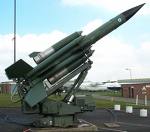Wednesday
May272009
The Implications of the Unmanned Aerial Vehicles Sales between Moscow and Tel Aviv
 Wednesday, May 27, 2009 at 12:06
Wednesday, May 27, 2009 at 12:06  Here's an international military manoeuvre to de-cipher: according to the Jerusalem Post, Israel is planning to expedite production of unmanned aerial vehicles for Russia.
Here's an international military manoeuvre to de-cipher: according to the Jerusalem Post, Israel is planning to expedite production of unmanned aerial vehicles for Russia.There are two starting points for an analysis. In summer 2008, when Russia was at war with Georgia, Amos Gilad, the head of the Israeli Defense Ministry’s Diplomatic-Security Bureau, visited Moscow and took away the guarantee that Russia would not sell the S300 defensive missile system to Iran. And only last week, Russia announced that it had decided to halt the sale of advanced MIG-31 fighter jets to Syria.
Contrary to a long-standing assumption, it appears that Moscow has not had significant leverage over Tehran’s nuclear enrichment. This may be partly because of Iran halted its nuclear weapons design and weaponization activities in fall 2003, as the latest CIA report reiterates.
Thus, Russia has to find other bargaining chips in the Middle Eastern game. And it need not worry --- even without a nuclear weapons programme, Iran has enough conventional weapons initiatives for either pretext or genuine fear, and there are other countries such as Syria who will have to be kept in their proper military place.
tagged  Amos Gilad,
Amos Gilad,  CIA,
CIA,  Georgia,
Georgia,  Iran,
Iran,  Israel,
Israel,  Jerusalem Post,
Jerusalem Post,  MIG-31,
MIG-31,  Moscow,
Moscow,  Russia,
Russia,  S300,
S300,  Syria,
Syria,  unmanned aerial vehicle in
unmanned aerial vehicle in  Global,
Global,  Middle East & Iran
Middle East & Iran
 Amos Gilad,
Amos Gilad,  CIA,
CIA,  Georgia,
Georgia,  Iran,
Iran,  Israel,
Israel,  Jerusalem Post,
Jerusalem Post,  MIG-31,
MIG-31,  Moscow,
Moscow,  Russia,
Russia,  S300,
S300,  Syria,
Syria,  unmanned aerial vehicle in
unmanned aerial vehicle in  Global,
Global,  Middle East & Iran
Middle East & Iran 
 For more than a year, US and Russian scientists and other experts
For more than a year, US and Russian scientists and other experts  Miriam Elder of Global Post notes the expulsion of two Russian diplomats by NATO on spying charges and Moscow's treaties with separatist regions to consider the consequences for relations between Moscow and Washington:
Miriam Elder of Global Post notes the expulsion of two Russian diplomats by NATO on spying charges and Moscow's treaties with separatist regions to consider the consequences for relations between Moscow and Washington: